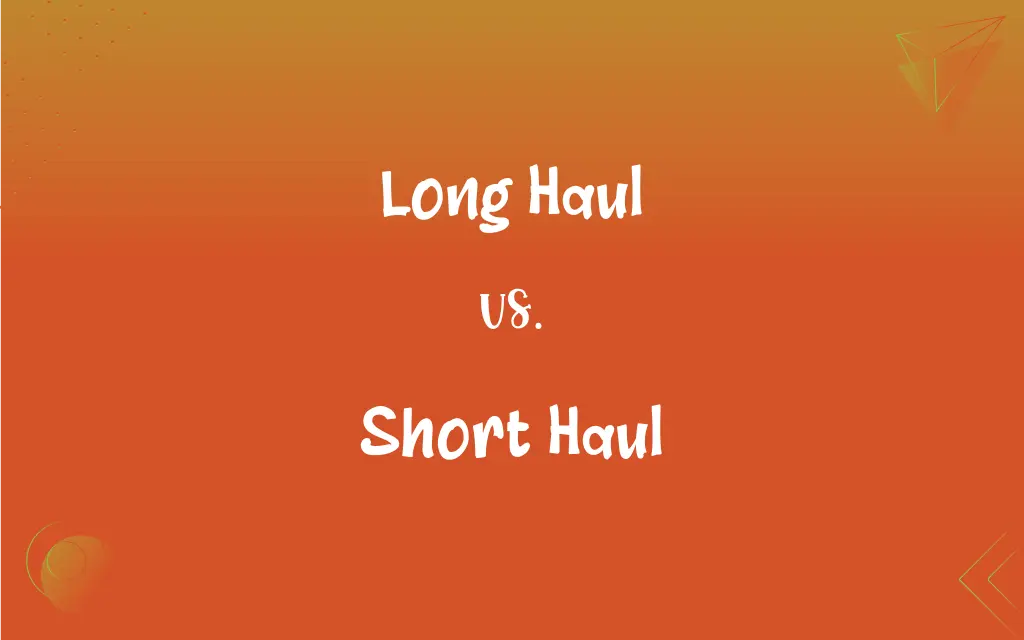Long Haul vs. Short Haul: What's the Difference?
Edited by Aimie Carlson || By Harlon Moss || Updated on November 28, 2023
Long haul refers to journeys or tasks that are of a great distance or duration, while short haul denotes those of a shorter distance or duration.

Key Differences
Long haul and short haul are terms predominantly used in transportation and logistics to describe the distance and duration of trips or deliveries. Long haul refers to journeys that cover a greater distance and typically involve extended periods of travel, often crossing multiple cities, states, or even countries. In contrast, short haul generally describes trips that are relatively shorter in distance and duration, usually confined within a local area or region. This distinction is crucial in planning logistics, allocating resources, and estimating travel or delivery times.
In the airline industry, long haul and short haul flights have distinct characteristics and serve different market needs. Long haul flights cover vast distances, often between continents, and require larger aircraft with higher fuel capacities and amenities for extended travel. Short haul flights, on the other hand, usually connect cities within the same continent and are characterized by shorter flying times, often using smaller aircraft. These differences affect ticket pricing, flight schedules, and the overall passenger experience.
For trucking and freight transport, the concepts of long haul and short haul have significant implications on operations and logistics. Long haul trucking often involves transporting goods over long distances, requiring drivers to spend several days or weeks on the road. Conversely, short haul trucking typically involves daily trips to nearby destinations, allowing drivers to return home at the end of the day. These differences impact driver lifestyles, vehicle maintenance, and the scheduling of deliveries.
In terms of environmental impact, long haul and short haul transportation methods exhibit different characteristics. Long haul transport, whether by air, sea, or land, often results in higher fuel consumption and greater carbon emissions due to the extended distances covered. Short haul transportation, while more frequent, may contribute less to overall emissions per trip but can still have significant cumulative environmental effects, especially in densely populated urban areas. Understanding these impacts is essential for developing sustainable transportation strategies.
From a business perspective, managing long haul and short haul operations requires different strategies and considerations. Long haul operations often involve complex logistics planning, including route optimization and adherence to various regional regulations. Short haul operations, while less complex in terms of distance, require efficient turnaround times and local market knowledge to be successful. Companies involved in transportation and logistics must tailor their approaches to effectively handle both long haul and short haul demands.
ADVERTISEMENT
Comparison Chart
Duration
Extended, several hours to days
Brief, usually a few hours
Distance
Covers great distances, often international
Typically regional or local
Transportation Mode
Often involves air travel, long-distance trucking
Usually involves road or short flights
Resource Usage
Higher due to longer distances and times
Lower, less resource-intensive
Suitability
Suited for long-term, extensive operations
Ideal for quick, efficient tasks
ADVERTISEMENT
Long Haul and Short Haul Definitions
Long Haul
Extended journeys or tasks that cover great distances or last for a long duration.
The flight from New York to Tokyo was a grueling long haul.
Short Haul
In logistics, refers to transporting goods over relatively short distances.
Short haul delivery services are essential for local businesses.
Long Haul
Used metaphorically to describe enduring a difficult situation over time.
Recovering from major surgery is a long haul for many patients.
Short Haul
In business, quick projects or operations that yield fast results.
Seasonal sales campaigns are often considered short haul strategies.
Long Haul
Referring to activities that require sustained effort over an extended period.
Completing a PhD is a long haul in terms of commitment and time.
Short Haul
Metaphorically, dealing with problems or situations that are quickly resolved.
Fixing the software bug was a short haul compared to the entire project.
Long Haul
In business, tasks or projects that take a long time to yield results.
Building a brand reputation is a long haul but worth the effort.
Short Haul
Short distance travel or tasks completed within a brief duration.
The cab ride to the downtown office was a quick short haul.
Long Haul
Used in logistics to describe transport over vast distances.
Long haul trucking often involves cross-country routes.
Short Haul
Activities or tasks that require minimal time and effort.
Organizing the weekly team meeting is a short haul task.
Long Haul
A long distance
It is a long haul from New York to Los Angeles.
Short Haul
A short distance
It's only a short haul from Detroit to Toledo.
Long Haul
A long period of time
Over the long haul the candidates performed well.
Short Haul
A short period of time
The repairs should hold up over the short haul.
Long Haul
Alternative spelling of long haul.
Short Haul
Traveling or involving a short distance.
Long Haul
Alternative spelling of long haul.
Long Haul
Alternative spelling of longhaul.
FAQs
What kind of cargo is suitable for long haul transport?
Goods that are not time-sensitive and can endure long transit times.
Is short haul travel less expensive than long haul?
Generally, yes, due to shorter distances and less resource usage.
How does long haul trucking differ from short haul?
Long haul trucking involves longer distances and time on the road, while short haul is regional.
Do short haul jobs require less experience than long haul?
Not necessarily, but they often involve different skill sets.
What defines a long haul flight?
A flight lasting six hours or more is typically considered long haul.
Can short haul flights use smaller airports?
Often, as they require less runway and facility space.
Are short haul tasks easier to manage?
They can be, due to their shorter nature and lower complexity.
Is short haul commuting common in urban areas?
Yes, it's typical in urban and suburban settings.
Are short haul services faster in delivery?
Yes, typically due to the shorter distances involved.
Does long haul affect vehicle maintenance differently?
Yes, it can lead to increased wear and tear.
What are the environmental impacts of long haul vs. short haul?
Long haul generally has a higher carbon footprint due to greater fuel consumption.
Can long haul travel lead to greater jet lag?
Yes, due to crossing multiple time zones.
Can long haul journeys be more stressful?
Potentially, due to the extended time and distance involved.
Are short haul flights more frequent than long haul?
Yes, they tend to be more frequent due to their shorter durations.
Does long haul require more strategic planning?
Yes, due to the complexities and risks involved with extended durations.
How does crew work differ in long haul flights?
Crews work in shifts due to longer flight durations, ensuring rest periods.
How do airlines cater differently to long haul passengers?
They often provide more amenities, like meals and entertainment.
Do short haul operations require less fuel?
Generally, yes, as they cover shorter distances.
Is there a higher demand for short haul transportation?
Often, especially in densely populated or urbanized areas.
Are short haul flights typically cheaper?
They can be, though pricing depends on various factors like demand and carrier.
About Author
Written by
Harlon MossHarlon is a seasoned quality moderator and accomplished content writer for Difference Wiki. An alumnus of the prestigious University of California, he earned his degree in Computer Science. Leveraging his academic background, Harlon brings a meticulous and informed perspective to his work, ensuring content accuracy and excellence.
Edited by
Aimie CarlsonAimie Carlson, holding a master's degree in English literature, is a fervent English language enthusiast. She lends her writing talents to Difference Wiki, a prominent website that specializes in comparisons, offering readers insightful analyses that both captivate and inform.































































